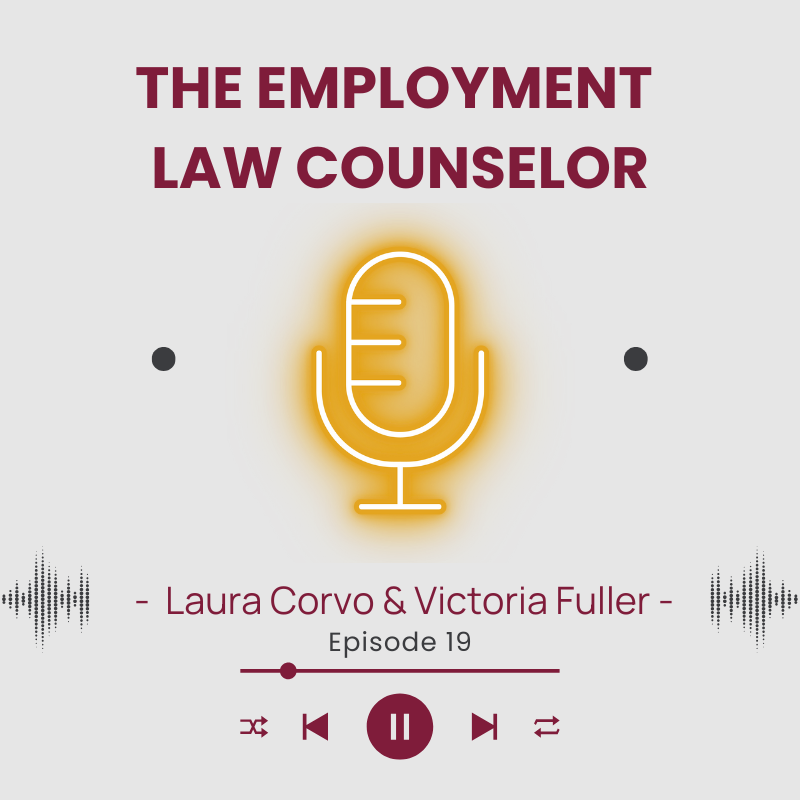January 7, 2022
WSHB Alert Status of “Federal Vaccine or Test Mandates”

Currently three “mandates” are making their way through the federal appeals system. Unfortunately, all three “mandates” are in different procedural postures. This update aims to clarify the status of things and to provide advice in this ever-changing environment.
OSHA’s ETS is Now Back in Place So What Should Employers Do?
The mandate that has the most wide-ranging impact is Occupational Health and Safety Administration’s (OSHA) Emergency Temporary Standard (ETS) that requires employers with 100 or more employees to either require those employees to obtain a COVID-19 vaccination or to prove compliance with a weekly-testing program. This ETS is expected to affect over eighty million employees.
On December 17, 2021, the Sixth Circuit Court of Appeals lifted the stay placed on OSHA’s ETS issued by the Fifth Circuit last month. The court held that OSHA does have statutory authority to mandate national vaccines and/or testing for employers with more than 100 employees. Specifically, it outlined that because COVID-19 is a virus that causes bodily harm, OSHA was well within its administrative authority to regulate the health and safety of employees.
Since the Sixth Circuit’s decision to dissolve the stay, OSHA announced that it will not be issuing citations for noncompliance with the ETS requirements until January 10, 2022 and the testing requirements will not be enforced until February 9, 2022 with the caveat that the employer must make good faith efforts to come into compliance as soon as possible.
After this ruling by the Sixth Circuit came down over the weekend, eight groups challenged the OSHA vaccine mandate and filed emergency applications with the U.S. Supreme Court asking it to stay the mandate again until the case can be heard in the highest court. On Monday, December 20th, 2021, the Supreme Court requested a response from the federal government by December 30th at 4 p.m. And, on December 22, 2021, in an almost unprecedented move, the Supreme Court ordered oral argument on these emergency applications. Oral argument will take place on January 7, 2022.
Despite the fact that the validity of the ETS is now squarely before the Supreme Court, employers should still operate as if the ETS will go into immediate effect. OSHA has now implemented new deadlines to reflect the current status of the ETS.
By January 10, 2022, employers should:
- Track employee vaccination status
- Create a database detailing vaccination information for each employee
- Require unvaccinated employees to wear a mask
- Provide paid time off for employees to get vaccinated and recover
As of February 9, 2022, employers must:
- Require Unvaccinated employees must start testing for COVID weekly. In this regard, self-administered or self-read tests would not comply. Employers must observe or use a proctor and have employees tested on site, or at a recognized testing facility.
The Federal Mandate is Stayed Nationwide
The second mandate is President Biden’s executive order that requires most federal employees or contractors to get vaccinated. This “mandate” does not have a testing option.
On December 7, 2021, the U.S. District Court for the Southern Section of Georgia granted a preliminary injunction to temporarily halt the enforcement of the Biden’s administration’s vaccine mandate for federal contractors. The court found that the administration had overstepped the bounds of it authority under the Federal Property and Administrative Services Act 40 U.S.C. 101 et. seq. The injunction effectively prohibits enforcement of the federal contractor vaccine mandate in all 50 states and any territory of the United States. However, in this quickly moving issue, the Eleventh Circuit, on December 17, 2021, denied the government’s motion to stay. This effectively upheld the injunction. The Court found that the government had failed to show that it “would be irreparably harmed absent a stay.”
The CMS Mandate is Paused in Twenty-Five States But is Not Being Enforced
The third is an interim file rule of the Centers for Medicare and Medicaid Services (CMS), which requires vaccination of all healthcare workers at CMS-covered facilities throughout the United States. The CMS mandate is currently enjoined by court order in 25 states and continues in full effect in 25 other states. After the ruling by the Fifth Circuit in November, however, CMS did suspend implementation and enforcement of the mandate pending resolution of the challenges before the Supreme Court.
The employment practice team at Wood, Smith, Henning and Berman will keep clients and interested parties apprised of all developments as they occur. Please do not hesitate to reach out to a member of our team should you have any questions or concerns.
The full decision by the Sixth Circuit can be accessed here: www.opn.ca6.uscourts.gov/opinions.pdf/21a0287p06.pdf

Christian Gunneson is a partner in WSHBs Tampa office, where he maintains a national practice assisting London market insuring and reinsuring syndicates and companies with various coverage matters and coverage litigation. He also regularly represents businesses in employment litigation and wrongful termination defense matters, harassment and retaliation claims, Americans with Disabilities Act (ADA) claims, Fair Labor Standards Act (FLSA) claims, and Florida Minimum Wage Act (FMWA) claims. In addition, his well-rounded experience includes representing attorneys and insurance brokers and agents in professional liability matters. He has represented businesses including some of the country’s largest insurance brokerages in trade secret, non-compete, and intellectual property litigation. A skilled litigator, he is known for handling complex coverage, employment, and general liability matters throughout the State of Florida and Connecticut, where he is also admitted.

Dana Ring is a partner in Wood, Smith, Henning & Bermans Dallas office, where her practice focuses on providing clients executive teams with strategic business advice on labor and employment issues, triaging and resolving pre-litigation employment claims, and litigation management. In addition to managing a nationwide docket of pre-litigation employment matters, Dana counsels employers on matters related to wrongful discharge, retaliation, harassment, discrimination, wage and hour compliance, FMLA leave and employment agreements. Dana advises employers on all aspects of responding to wage and hour audits conducted by the Department of Labor and similar state agencies, as well as conducting self-audits to ensure proactive compliance. Dana also represents employers in response to NLRB complaints of unfair labor practices under the National Labor Relations Act, which applies to all workplaces regardless of union representation. She further advises in-house counsel, senior leaders, and human resources professionals on employee discipline, investigations, terminations, layoffs, and preventative measures such as training, policies and handbooks. With more than 20 years in practice, Dana has mastered the art of identifying and addressing the key drivers in any legal dispute, which often involve the interpersonal dynamics between the parties, to achieve an efficient resolution in the best interest of her clients.

Currently three “mandates” are making their way through the federal appeals system. Unfortunately, all three “mandates” are in different procedural postures. This update aims to clarify the status of things and to provide advice in this ever-changing environment.
OSHA’s ETS is Now Back in Place So What Should Employers Do?
The mandate that has the most wide-ranging impact is Occupational Health and Safety Administration’s (OSHA) Emergency Temporary Standard (ETS) that requires employers with 100 or more employees to either require those employees to obtain a COVID-19 vaccination or to prove compliance with a weekly-testing program. This ETS is expected to affect over eighty million employees.
On December 17, 2021, the Sixth Circuit Court of Appeals lifted the stay placed on OSHA’s ETS issued by the Fifth Circuit last month. The court held that OSHA does have statutory authority to mandate national vaccines and/or testing for employers with more than 100 employees. Specifically, it outlined that because COVID-19 is a virus that causes bodily harm, OSHA was well within its administrative authority to regulate the health and safety of employees.
Since the Sixth Circuit’s decision to dissolve the stay, OSHA announced that it will not be issuing citations for noncompliance with the ETS requirements until January 10, 2022 and the testing requirements will not be enforced until February 9, 2022 with the caveat that the employer must make good faith efforts to come into compliance as soon as possible.
After this ruling by the Sixth Circuit came down over the weekend, eight groups challenged the OSHA vaccine mandate and filed emergency applications with the U.S. Supreme Court asking it to stay the mandate again until the case can be heard in the highest court. On Monday, December 20th, 2021, the Supreme Court requested a response from the federal government by December 30th at 4 p.m. And, on December 22, 2021, in an almost unprecedented move, the Supreme Court ordered oral argument on these emergency applications. Oral argument will take place on January 7, 2022.
Despite the fact that the validity of the ETS is now squarely before the Supreme Court, employers should still operate as if the ETS will go into immediate effect. OSHA has now implemented new deadlines to reflect the current status of the ETS.
By January 10, 2022, employers should:
- Track employee vaccination status
- Create a database detailing vaccination information for each employee
- Require unvaccinated employees to wear a mask
- Provide paid time off for employees to get vaccinated and recover
As of February 9, 2022, employers must:
- Require Unvaccinated employees must start testing for COVID weekly. In this regard, self-administered or self-read tests would not comply. Employers must observe or use a proctor and have employees tested on site, or at a recognized testing facility.
The Federal Mandate is Stayed Nationwide
The second mandate is President Biden’s executive order that requires most federal employees or contractors to get vaccinated. This “mandate” does not have a testing option.
On December 7, 2021, the U.S. District Court for the Southern Section of Georgia granted a preliminary injunction to temporarily halt the enforcement of the Biden’s administration’s vaccine mandate for federal contractors. The court found that the administration had overstepped the bounds of it authority under the Federal Property and Administrative Services Act 40 U.S.C. 101 et. seq. The injunction effectively prohibits enforcement of the federal contractor vaccine mandate in all 50 states and any territory of the United States. However, in this quickly moving issue, the Eleventh Circuit, on December 17, 2021, denied the government’s motion to stay. This effectively upheld the injunction. The Court found that the government had failed to show that it “would be irreparably harmed absent a stay.”
The CMS Mandate is Paused in Twenty-Five States But is Not Being Enforced
The third is an interim file rule of the Centers for Medicare and Medicaid Services (CMS), which requires vaccination of all healthcare workers at CMS-covered facilities throughout the United States. The CMS mandate is currently enjoined by court order in 25 states and continues in full effect in 25 other states. After the ruling by the Fifth Circuit in November, however, CMS did suspend implementation and enforcement of the mandate pending resolution of the challenges before the Supreme Court.
The employment practice team at Wood, Smith, Henning and Berman will keep clients and interested parties apprised of all developments as they occur. Please do not hesitate to reach out to a member of our team should you have any questions or concerns.
The full decision by the Sixth Circuit can be accessed here: www.opn.ca6.uscourts.gov/opinions.pdf/21a0287p06.pdf

Christian Gunneson is a partner in WSHBs Tampa office, where he maintains a national practice assisting London market insuring and reinsuring syndicates and companies with various coverage matters and coverage litigation. He also regularly represents businesses in employment litigation and wrongful termination defense matters, harassment and retaliation claims, Americans with Disabilities Act (ADA) claims, Fair Labor Standards Act (FLSA) claims, and Florida Minimum Wage Act (FMWA) claims. In addition, his well-rounded experience includes representing attorneys and insurance brokers and agents in professional liability matters. He has represented businesses including some of the country’s largest insurance brokerages in trade secret, non-compete, and intellectual property litigation. A skilled litigator, he is known for handling complex coverage, employment, and general liability matters throughout the State of Florida and Connecticut, where he is also admitted.

Dana Ring is a partner in Wood, Smith, Henning & Bermans Dallas office, where her practice focuses on providing clients executive teams with strategic business advice on labor and employment issues, triaging and resolving pre-litigation employment claims, and litigation management. In addition to managing a nationwide docket of pre-litigation employment matters, Dana counsels employers on matters related to wrongful discharge, retaliation, harassment, discrimination, wage and hour compliance, FMLA leave and employment agreements. Dana advises employers on all aspects of responding to wage and hour audits conducted by the Department of Labor and similar state agencies, as well as conducting self-audits to ensure proactive compliance. Dana also represents employers in response to NLRB complaints of unfair labor practices under the National Labor Relations Act, which applies to all workplaces regardless of union representation. She further advises in-house counsel, senior leaders, and human resources professionals on employee discipline, investigations, terminations, layoffs, and preventative measures such as training, policies and handbooks. With more than 20 years in practice, Dana has mastered the art of identifying and addressing the key drivers in any legal dispute, which often involve the interpersonal dynamics between the parties, to achieve an efficient resolution in the best interest of her clients.
News Type
PLUS Blog
Business Line
Employment Practices Liability (EPL)
Topic
Professional Liability (PL) Insurance
Contribute to
PLUS Blog
Contribute your thoughts to the PLUS Membership consisting of 45,000+ Professional Liability Practitioners.
Related Podcasts

The Employment Law Counselor Episode 19
Reductions in Risk for Reductions in Force In this episode of The…
Related Articles

Navigating EPL Trends Across North America: Key Risks and Insights for 2025 Webinar Recap
Employment Practices Liability (EPL) risks are becoming increasingly complex as workplace norms…

Mitigating the Risks of Reductions in Force: Lessons from The Employment Law Counselor
In the latest episode of The Employment Law Counselor, hosts Victoria Fuller…

Employment Discrimination and Retaliation – Best Practices to Avoid Headaches
There is little doubt that an employment-discrimination lawsuit is an unsettling experience…
